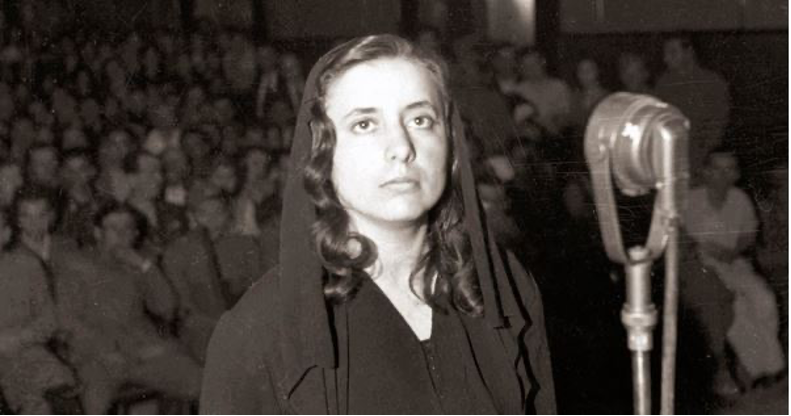
Musine Kokalari at her trial in 1946
@ Directory of Archives of Albania
This Story belongs to the Writers in Prison Committee.
Biography
Musine Kokalari was born in February 1917 in Adana, Turkey and three years later moved with her family to Albania. In 1938 she went to Italy to study at the Royal University of Rome, La Sapienza, and graduated in 1941, having achieved a doctorate in literature.
Upon her return to Albania later that year her collection of poems As My Old Mother Tells Me was published, said to be the first collection of writings by an Albanian woman writer to be published in Albania.
She had two more collections of short stories published in the early 1940s – How Life Swayed and Around the Hearth.
During 1943-1944 Kokalari became one of the founding members of the Social Democratic Party and was closely associated with the party newspaper Voice of Freedom. Born into a wealthy and politically active family, her two brothers were owners of a printing company. Both were executed by Communist leaders in 1944.
In 1946 Kokalari herself was arrested and sentenced to twenty years in prison for being an “enemy of the people”. Prior to her arrest, she had sent a letter to the Allied Forces based in the Albanian capital, Tirana, calling for free elections and freedom of expression. At her trial, Kokalari made a statement that has since become emblematic of the struggle for freedom in Albania: “I don’t need to be a communist to love my country. I love my country even though I am not a communist. I love its progress. You boast that you have won the war, and now you are the winner you want to extinguish those who you call political opponents. I think differently from you but I love my country. You are punishing me for my ideals!”.
Kokalari was released after eighteen years’ incarceration in 1961 and transferred to a labour camp where she worked as a labourer on construction sites. When she contracted cancer, she was able to go to Tirana to receive hospital treatment. She was subsequently transferred to the Community Cleaning Department where she served the rest of her days. Kokalari was never allowed to resume her writing. She died on 14 August 1983.
Kokalari was among over thirty writers from Albania, France, Hungary and Czechoslovakia to be considered by the first meeting of the “Committee of Three”, in 1960, the precursor to the present-day International PEN Writers in Prison Committee. It is said that when PEN presented a letter calling for Kokalari and other prisoners’ release, then Albanian President Enver Hoxha is said to have retorted “Is that bitch still alive?”. In 1993 Kokalari was posthumously declared a ‘Martyr for Democracy’ by the President of Albania and a school in Tirana now bears her name. In 2017 her image featured on a postage stamp, another tribute to her struggle for free expression.
Useful links
‘Albanian Literature: A short history by Robert Elsie (2005): http://books.google.com/books?id=ox3Wx1Nl_2MC&pg=PA157&dq=Musine+Kokalari#.
http://en.wikipedia.org/wiki/Musine_Kokalari.
http://thebalkanista.com/2019/05/27/why-are-we-forgetting-musine-kokalari/.